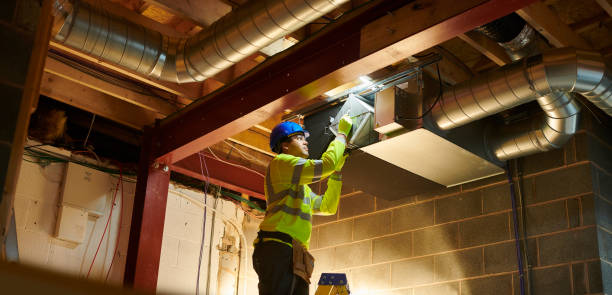Heating and air conditioning systems are often seen as the unsung heroes of home comfort, overshadowed by more immediate home improvements. Yet, they carve their niche with undeniable importance in maintaining a comfortable and energy-efficient living space. This unique role sets them apart in the vast world of home maintenance, offering a distinct experience that distinguishes heating and air conditioning as categories in their own right.
Key types of systems include Central Air, Heat Pumps, and Ductless Mini-Splits, each known for their distinct advantages. Single-Stage and Multi-Stage systems also stand out, offering tailored solutions for different climate needs and home sizes. Going a bit deeper, each type of heating and air conditioning system presents its own set of efficiencies, installation techniques, historical significance, and recommendations for maintenance.
The following sections will explore these aspects in detail, providing a richer understanding of what makes heating and air conditioning systems a crucial investment for homeowners worldwide.
What is the typical lifespan of HVAC systems?
The typical lifespan of HVAC systems ranges between 15 to 20 years. This can vary depending on the system type, usage patterns, and the level of maintenance it receives. Central air conditioners and heat pumps generally fall within this expected lifespan, while furnaces can last a bit longer, sometimes exceeding 20 years with proper care.
Regular maintenance and timely repairs are key to maximizing the life of these systems. Knowing this lifespan is crucial for homeowners to plan for maintenance and understand when it might be time to replace their HVAC system to ensure efficient and comfortable indoor environments.
Read more: How Long do HVAC Systems Last?
Signs your HVAC system needs replacing
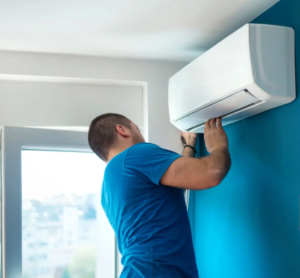
When your HVAC system begins to require frequent repairs, particularly more than once a year, this is a critical indicator that it may be time for a replacement. Experiencing inconsistent temperatures across different rooms or an increase in energy bills despite normal usage points to a loss of efficiency. Additionally, strange noises or smells emanating from the system should not be ignored, as they can signal serious issues.
These signs are not only inconvenient but also suggest that the system is no longer operating efficiently, potentially leading to increased costs and safety concerns. Recognizing these signs early can save homeowners from discomfort and financial strain.
Frequent repairs more than once a year
If your HVAC system needs repairs more than once a year, this is a clear sign that it may be nearing the end of its useful life. Frequent malfunctions not only add up in costs but also indicate that the system might be beyond simple fixes.
Inconsistent temperatures across different rooms
When you notice inconsistent temperatures in different areas of your home, it suggests that your HVAC system is failing to distribute air effectively. This variability in comfort levels is a telltale sign that your system might need replacing.
Increased energy bills despite normal usage
An increase in energy bills, despite your usage habits remaining the same, signals a loss in your HVAC system’s efficiency. Older systems tend to work harder to maintain comfort, leading to higher energy consumption and bills.
Strange noises or smells coming from the system
Strange noises or smells coming from your HVAC system are indicators of potential mechanical failures or health hazards, such as mold growth. These signs should not be overlooked, as they often mean that your system requires immediate attention or replacement.
Related Reading: Why is My HVAC Making Noise?
How to extend the lifespan of your HVAC system
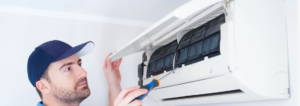
Extending the lifespan of your HVAC system can be achieved through a few key practices. Regular maintenance, including annual inspections, plays a vital role in identifying and resolving issues before they escalate. It’s also important to address timely repairs of any size, as neglecting minor issues can lead to major problems down the line.
Upgrading parts of your system, such as installing a more efficient thermostat, can significantly improve performance and efficiency. Lastly, changing filters every 3-6 months is crucial for maintaining good air quality and ensuring your system runs smoothly. By following these steps, you can not only prolong the life of your HVAC system but also enhance its efficiency, leading to cost savings and a more comfortable home environment.
Regular maintenance, including annual inspections
Regular HVAC maintenance and annual inspections are pivotal for sustaining your HVAC system’s health. These proactive steps can uncover minor issues before they evolve into larger, more expensive problems, effectively extending your system’s operational life.
Timely repairs of any issues, big or small
Ensuring timely AC repairs for both minor glitches and major malfunctions is critical. Swift action not only prevents further damage but also maintains the system’s efficiency and reliability over time.
Upgrading parts, like thermostats, for efficiency
Upgrading parts, such as replacing outdated thermostats with modern, more efficient models, can significantly boost your system’s performance. These upgrades can lead to enhanced energy efficiency and reduced operating costs.
Changing filters every 3-6 months
Changing filters every 3-6 months is a simple yet effective way to keep your HVAC system running smoothly. Regular filter changes prevent the buildup of dust and debris, which can impede airflow and degrade system efficiency.
Factors to consider before replacing your system
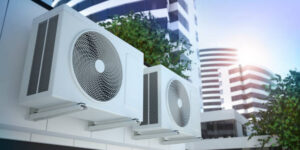
Before making the decision to replace your HVAC system, several critical factors should be weighed. The age of the system stands out as a primary consideration; if your system is approaching or has surpassed the 15-20-year mark, replacement may be the most sensible path forward. Evaluating the cost of repairs versus replacement is also essential; when the expense of frequent repairs begins to rival the cost of a new system, it may be more economical to opt for replacement.
Advances in technology mean that newer systems offer improved efficiency and features, which can lead to significant savings on energy bills and enhance indoor air quality. Additionally, the environmental impact and the availability of greener alternatives are important to consider, as modern systems tend to have a smaller carbon footprint and offer a more environmentally friendly option. Taking these factors into account will help homeowners make a well-informed decision, balancing comfort, cost, and environmental impact.
Age of the system, typically 15-20 years for HVAC
The age of the system is a pivotal factor, with most HVAC units designed to last 15-20 years. Beyond this period, systems often see a drop in efficiency and reliability, nudging towards the practicality of replacement.
Cost of repairs vs. replacement over time
Weighing the cost of repairs against the cost of replacement is crucial. When repair expenses begin to rival the investment in a new, more efficient system, transitioning to a replacement could emerge as the more economically sound choice.
Advances in technology offering better efficiency
Technological advances have ushered in a new era of HVAC systems characterized by enhanced efficiency. These innovations promise not only reduced energy consumption but also improved home comfort and operational performance.
Environmental impact and potential for greener alternatives
Considering the environmental impact and exploring greener alternatives are increasingly vital. Modern HVAC solutions often boast a reduced carbon footprint and support sustainable living, offering a compelling argument for replacement with an eye toward environmental stewardship.
Benefits of replacing your HVAC system

Replacing your HVAC system brings several key benefits. Firstly, it leads to improved energy efficiency, which can significantly reduce your energy bills. Modern systems are engineered to heat and cool your home more efficiently, utilizing less energy in the process.
Additionally, a new HVAC system can enhance indoor air quality by minimizing pollutants and allergens, creating a healthier environment for you and your family. Comfort levels will also improve, thanks to more consistent temperatures and better humidity control throughout your home. Furthermore, upgrading to a newer system can increase your property’s value and appeal, making it an attractive investment for homeowners considering future resale.
Improved energy efficiency, reducing bills
Improved energy efficiency stands out as a key advantage of upgrading your HVAC system, leading to a noticeable reduction in energy bills. Modern systems are specifically designed for efficiency, consuming less power to maintain your home’s temperature, which translates into significant financial savings over the lifespan of the system.
Better indoor air quality with modern systems
Upgrading to a newer HVAC system can significantly improve indoor air quality. Advanced filtration technologies in modern systems work to effectively reduce the presence of pollutants and allergens in your home’s air, promoting a healthier environment for you and your loved ones.
Enhanced comfort with consistent temperatures
A new HVAC system provides enhanced comfort by ensuring consistent temperatures across all rooms. This improvement addresses and eliminates the issue of uneven heating or cooling, thus maintaining a steady and comfortable indoor climate regardless of the season.
Increased property value and appeal
Increasing your property’s value and appeal is another compelling benefit of replacing your HVAC system. A modern, efficient HVAC system is a strong selling point for potential buyers, enhancing your home’s marketability and potentially boosting its resale value.
Steps to take when replacing your HVAC system
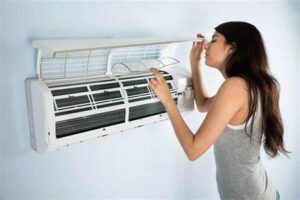
When the time comes to replace your HVAC system, beginning with researching new systems is crucial. This research should focus on understanding the efficiency ratings and features of available systems. Next, it’s vital to consult with a professional who can provide advice tailored to your home’s specific requirements and structure.
Another important step is evaluating financing options and rebates, which can make the investment more manageable. Lastly, consider the timing for the replacement, as off-season installation deals can offer substantial cost savings. Following these steps will ensure that you select the most suitable system for your home, achieving optimal comfort, energy efficiency, and financial benefits.
Researching new systems for efficiency ratings
Initiating your replacement journey by researching new systems to understand their efficiency ratings is a critical first step. This ensures you select a system that not only meets your comfort needs but also operates at peak efficiency, reducing long-term energy costs.
Consulting with a professional for tailored advice
Consulting with a professional HVAC technician or consultant is indispensable for obtaining tailored advice. Their expertise can guide you to the most appropriate system for your home’s unique layout and your personal preferences, ensuring optimal efficiency and comfort.
Evaluating financing options and rebates
Evaluating financing options and rebates can make a new HVAC system more affordable. Many energy-efficient systems qualify for rebates or special financing terms, easing the financial burden of upgrading to a more efficient and effective system.
Considering the timing for off-season installation deals
Considering the timing of your HVAC system replacement can lead to significant savings. Seeking out off-season installation deals can result in lower prices, as demand for installation services decreases during certain times of the year, making it a strategic move to plan your replacement accordingly.
The Bottomline: When is it time to replace HVAC systems?
Determining the right time to replace your HVAC system involves recognizing key signs. It’s time for a replacement when your system exceeds its expected lifespan of 15-20 years, suffers from frequent malfunctions, or necessitates expensive repairs that rival the cost of a new unit. Moreover, if your system lacks efficiency, leading to higher energy bills, or cannot maintain consistent indoor temperatures, these are definitive indicators that a new system is needed.
Upgrading to a modern system can provide significant benefits, including enhanced efficiency, improved air quality, and greater comfort levels, making the investment well worth considering.
Get Professional Help from Callidus Air
When it’s time to replace your HVAC system, getting professional help from Callidus Air can make all the difference. Our experienced HVAC team offers expert guidance throughout the entire replacement process, ensuring you select the best system for your specific needs. We provide tailored advice to evaluate your current system and introduce you to the latest advancements in HVAC technology.
Furthermore, Callidus Air assists in identifying financing options and rebates to make your new system investment more affordable. With Callidus Air, you’re guaranteed a seamless, informed transition to a more efficient and comfortable home environment. Get started today by contacting us!
In Summary
Replacing your HVAC system is a pivotal move towards improved energy efficiency, enhanced indoor air quality, and greater comfort in your home. Signs that it’s time for a replacement include the age of your system, increasing energy bills, and inconsistent temperatures. Engaging in proactive steps like consulting with HVAC professionals and exploring the latest in HVAC technology ensures an informed decision-making process.
Callidus Air stands ready to assist, providing expert advice and support to help you select the ideal system tailored to your needs. An investment in a new HVAC system not only elevates your living environment but also contributes to increasing your property’s value and appeal.

